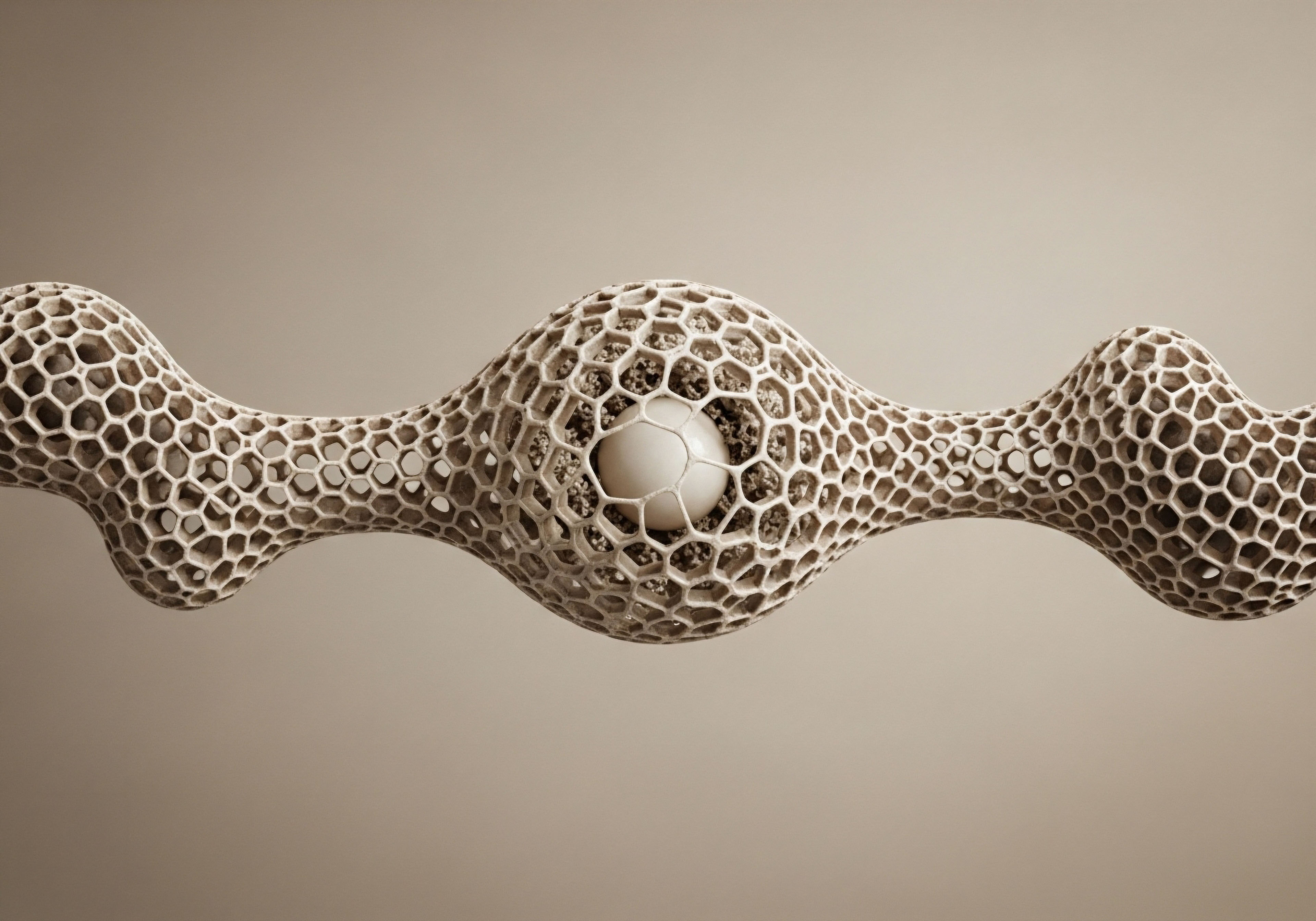

Fundamentals
Have you ever found yourself searching for a word that used to come effortlessly, or perhaps walked into a room only to forget why you entered? Many individuals experience these moments, often dismissing them as simple signs of aging or daily stress.
Yet, for some, these fleeting instances evolve into a persistent cloudiness, a dulling of mental sharpness that affects daily life. This feeling, a subtle but persistent erosion of cognitive vitality, is a lived experience that can be deeply unsettling.
It can manifest as a diminished capacity for focus, a struggle with memory recall, or a general sense of mental fatigue that no amount of rest seems to alleviate. This internal shift, though frequently unacknowledged in broader conversations about health, often signals a deeper biological narrative unfolding within the body.
The human body operates as an intricate network of communication systems, with the endocrine system serving as a primary messenger service. Hormones, these chemical messengers, travel throughout the bloodstream, influencing nearly every cell, tissue, and organ. Their reach extends profoundly into the central nervous system, orchestrating processes that underpin our thoughts, emotions, and overall cognitive capabilities.
When these vital chemical signals fall out of their optimal range, the effects can ripple across various bodily systems, including the delicate architecture of the brain.
Understanding the connection between hormonal balance and brain function represents a significant step toward reclaiming mental clarity and sustained cognitive performance. The brain, a highly metabolically active organ, relies on a consistent and precise supply of these biochemical agents to maintain its complex operations.
Hormones influence neuronal health, synaptic plasticity ∞ the brain’s ability to adapt and form new connections ∞ and even the generation of new brain cells, a process known as neurogenesis. A decline in specific hormonal levels, or an imbalance among them, can therefore directly impact these fundamental brain processes, contributing to the cognitive symptoms many individuals report.
Cognitive vitality often reflects the intricate balance of the body’s hormonal messaging system, influencing brain health and mental sharpness.
The concept of hormone optimization moves beyond merely addressing deficiencies; it involves recalibrating the endocrine system to support peak physiological function. This approach recognizes that symptoms like mental fogginess, reduced processing speed, or difficulty concentrating are not isolated incidents. Instead, they are often outward expressions of an internal biochemical environment that has drifted from its ideal state.
By carefully assessing and adjusting hormonal levels, it becomes possible to support the brain’s inherent capacity for repair, adaptation, and sustained high-level function. This personalized strategy aims to restore the internal equilibrium that allows for a vibrant, functional mind, free from the constraints of hormonal imbalance.

The Brain’s Biochemical Orchestra
The brain, a complex organ, functions through a symphony of biochemical interactions. Hormones play a critical role in directing this orchestra, influencing everything from mood regulation to complex problem-solving. Each hormone contributes a unique note to this composition, and when one is out of tune, the entire melody can suffer.
For instance, sex steroids, such as testosterone and estrogens, exert widespread effects on brain regions associated with memory and learning, including the hippocampus and prefrontal cortex. Their presence at optimal levels supports neuronal health and communication.
Beyond the sex steroids, other hormonal players, including growth hormone and thyroid hormones, also contribute significantly to cognitive well-being. Growth hormone, for example, is deeply involved in neurogenesis and synaptic plasticity, processes vital for learning and memory. Thyroid hormones regulate metabolic rate across all cells, including neurons, directly impacting energy production and neurotransmitter synthesis within the brain.
A subtle deviation in any of these hormonal signals can lead to noticeable changes in cognitive performance, affecting daily tasks and overall mental acuity.

Understanding Hormonal Influence on Cognition
The influence of hormones on cognitive function is multifaceted, extending to various domains of mental performance. These domains include verbal memory, the ability to recall words and language; spatial memory, the capacity to remember locations and navigate environments; and executive functions, which encompass planning, attention, and problem-solving.
When hormonal levels are suboptimal, individuals may experience difficulties in one or more of these areas. For example, men with low testosterone often report impairments in working memory and visuospatial processing. Similarly, women experiencing menopausal transitions frequently describe challenges with verbal recall and attention.
The underlying mechanisms for these cognitive changes are complex. Hormones can modulate neurotransmitter levels, reduce neuroinflammation, and protect neurons from oxidative stress. They also influence cerebral blood flow, ensuring that brain cells receive adequate oxygen and nutrients. Recognizing these connections allows for a more targeted approach to addressing cognitive concerns, moving beyond symptomatic relief to address the root biochemical imbalances.


Intermediate
When the subtle shifts in cognitive function become more pronounced, a deeper understanding of specific biochemical recalibration protocols becomes essential. These protocols are not merely about replacing what is missing; they represent a precise strategy to restore the body’s internal communication systems, particularly those governing brain health. The goal is to re-establish a physiological balance that supports optimal mental performance and overall vitality. This involves a careful consideration of individual hormonal profiles and the targeted application of therapeutic agents.
Consider the endocrine system as a sophisticated internal messaging service, where hormones are the messages themselves. When these messages are clear, consistent, and delivered in the correct amounts, the body’s systems, including the brain, operate with seamless efficiency.
However, when the signaling becomes disrupted ∞ due to age, stress, or other factors ∞ the brain’s ability to process information, form memories, and maintain focus can diminish. Personalized wellness protocols aim to fine-tune this messaging system, ensuring that the brain receives the precise signals it needs to function at its best.

Testosterone Optimization for Men
For men experiencing symptoms of diminished testosterone, often termed andropause, targeted testosterone replacement therapy (TRT) can offer significant benefits, including improvements in cognitive function. Low testosterone levels have been linked to impairments in memory tasks, working memory, and visuospatial processing. By restoring testosterone to a normative range, TRT aims to mitigate these cognitive deficits.
A standard protocol for male testosterone optimization frequently involves weekly intramuscular injections of Testosterone Cypionate (200mg/ml). This method provides a consistent supply of the hormone, allowing for stable physiological levels. To maintain the body’s natural testosterone production and preserve fertility, Gonadorelin is often included, administered as subcutaneous injections twice weekly. Gonadorelin stimulates the release of luteinizing hormone (LH) and follicle-stimulating hormone (FSH) from the pituitary gland, which in turn supports testicular function.
Additionally, to manage potential side effects such as the conversion of testosterone to estrogen, an aromatase inhibitor like Anastrozole may be prescribed as a twice-weekly oral tablet. This helps to prevent excessive estrogen levels, which can have their own set of undesirable effects.
In some cases, Enclomiphene may be incorporated into the protocol to further support LH and FSH levels, particularly when fertility preservation is a primary concern. Research indicates that testosterone can exert neuroprotective effects by modulating neurotransmitter levels, enhancing neurogenesis, and reducing neuroinflammation within the brain. This contributes to improved verbal memory and cognitive flexibility observed in some men undergoing TRT.

Hormonal Balance for Women
Women navigating the complexities of pre-menopausal, peri-menopausal, and post-menopausal transitions often experience a range of symptoms, including irregular cycles, mood changes, hot flashes, and reduced libido. These hormonal shifts can also impact cognitive function, leading to concerns about memory and mental clarity. Personalized protocols for women focus on restoring a delicate hormonal balance to address these symptoms and support cognitive health.
Testosterone Cypionate is typically administered to women via subcutaneous injection, often at a low dose of 10 ∞ 20 units (0.1 ∞ 0.2ml) weekly. While testosterone is primarily associated with male physiology, it plays a vital role in female health, influencing libido, mood, and cognitive function. Progesterone is another critical component, prescribed based on the individual’s menopausal status.
Natural progesterone, distinct from synthetic progestins, has shown neuroprotective effects and potential benefits for cognitive function, including visual and verbal working memory. It can influence regional brain activation patterns, supporting areas involved in memory.
For sustained hormonal delivery, Pellet Therapy, involving long-acting testosterone pellets, may be an option. Similar to male protocols, Anastrozole can be used when appropriate to manage estrogen levels, particularly if there is a tendency towards excessive aromatization of testosterone. The timing of hormonal intervention for women appears to be a significant factor, with some evidence suggesting greater cognitive benefits when therapy is initiated closer to the onset of menopause.
Personalized hormone protocols for men and women aim to restore optimal physiological balance, supporting cognitive function through targeted biochemical recalibration.

Growth Hormone Peptide Therapy
Beyond traditional hormone replacement, targeted peptide therapies offer another avenue for supporting overall well-being, including cognitive function. These peptides work by stimulating the body’s natural production of growth hormone, which plays a significant role in cellular repair, metabolic regulation, and neurogenesis. Active adults and athletes often seek these therapies for anti-aging benefits, muscle gain, fat loss, and improved sleep, all of which indirectly support cognitive health.
Key peptides in this category include ∞
- Sermorelin ∞ A growth hormone-releasing hormone (GHRH) analog that stimulates the pituitary gland to produce and secrete growth hormone.
- Ipamorelin / CJC-1295 ∞ These peptides work synergistically to promote a sustained and physiological release of growth hormone.
Ipamorelin is a selective growth hormone secretagogue, while CJC-1299 (without DAC) is a GHRH analog.
- Tesamorelin ∞ A GHRH analog approved for specific conditions, known for its effects on body composition and potential cognitive benefits.
- Hexarelin ∞ Another growth hormone secretagogue that also has direct effects on the heart and other tissues.
- MK-677 ∞ An oral growth hormone secretagogue that stimulates the pituitary to release growth hormone.
Growth hormone and its downstream mediator, insulin-like growth factor 1 (IGF-1), are crucial regulators of neurogenesis and neuronal connectivity, particularly in the hippocampus, a brain region vital for learning and memory. Studies indicate that increasing growth hormone levels can enhance neural precursor cell proliferation, boost neurogenesis, and improve cognitive function.
GHRH, the natural counterpart to peptides like Sermorelin, has been shown to promote the survival and proliferation of neural stem cells and reduce toxicity from amyloid-beta, a protein associated with neurodegenerative conditions.

Other Targeted Peptides
The realm of peptide therapy extends to other specialized agents that address specific physiological needs, some of which indirectly support cognitive well-being by improving overall systemic health.
One such peptide is PT-141, primarily used for sexual health. By addressing issues like low libido, which can be intertwined with hormonal imbalances and psychological well-being, PT-141 can contribute to an improved quality of life that supports mental clarity and reduced stress.
Another notable peptide is Pentadeca Arginate (PDA). This agent is recognized for its roles in tissue repair, healing processes, and inflammation modulation. Chronic inflammation, a systemic issue, has been increasingly linked to cognitive decline and neurodegenerative processes. By mitigating inflammation and supporting tissue repair, PDA can contribute to a healthier internal environment that is more conducive to optimal brain function.
While not directly targeting cognitive pathways, these peptides underscore the interconnectedness of bodily systems, where improvements in one area can cascade into benefits for overall mental and physical vitality.
| Hormone/Peptide | Primary Action | Cognitive Relevance |
|---|---|---|
| Testosterone | Androgen receptor activation, neuroprotection | Memory, executive function, reduced neuroinflammation |
| Estrogen (Estradiol) | Estrogen receptor modulation, neuroprotection | Verbal memory, synaptic plasticity, cerebral blood flow |
| Progesterone | Neurosteroid production, GABA-A modulation | Visual memory, verbal working memory, neuroprotection |
| Growth Hormone (GH) | Stimulates IGF-1, promotes cellular growth | Neurogenesis, synaptic connectivity, learning, memory |
| Sermorelin / CJC-1295 | GHRH analogs, stimulate GH release | Indirectly supports GH-mediated cognitive benefits |
| PT-141 | Melanocortin receptor agonist | Improved sexual health, indirectly supports mental well-being |
| Pentadeca Arginate (PDA) | Tissue repair, inflammation modulation | Reduces systemic inflammation, supporting brain health |


Academic
The long-term cognitive benefits of hormone optimization extend into the intricate depths of neuroendocrinology, revealing a sophisticated interplay between the endocrine system and brain function. This systems-biology perspective moves beyond a simplistic view of individual hormones, instead examining how complex biological axes, metabolic pathways, and neurotransmitter systems collectively influence cognitive longevity.
The brain is not merely a passive recipient of hormonal signals; it actively participates in their synthesis and metabolism, creating a localized neurochemical environment that profoundly impacts neuronal health and function.
Understanding these deep biological mechanisms is paramount for appreciating the enduring impact of targeted hormonal interventions. The brain itself synthesizes certain steroids, known as neurosteroids, from cholesterol or steroidal precursors. These compounds, such as allopregnanolone and pregnenolone sulfate, rapidly modulate neuronal excitability by interacting with ligand-gated ion channels and other cell surface receptors, independent of traditional genomic steroid hormone receptor actions.
For instance, allopregnanolone, a metabolite of progesterone, acts as a positive allosteric modulator of GABA-A receptors, enhancing inhibitory signaling and contributing to calming effects and potentially improved memory. Conversely, pregnenolone sulfate can act as a negative GABA-A receptor modulator, promoting neuronal excitability and memory enhancement. This localized synthesis and rapid action underscore the brain’s capacity for self-regulation and its reliance on a precise neurochemical milieu.

How Does the Hypothalamic-Pituitary-Gonadal Axis Influence Cognitive Longevity?
The Hypothalamic-Pituitary-Gonadal (HPG) axis represents a central regulatory pathway for sex hormones, and its integrity is intimately linked to cognitive health across the lifespan. This axis operates through a negative feedback loop ∞ the hypothalamus releases gonadotropin-releasing hormone (GnRH), which stimulates the pituitary gland to secrete luteinizing hormone (LH) and follicle-stimulating hormone (FSH). These gonadotropins then act on the gonads (testes in men, ovaries in women) to produce sex steroids like testosterone and estrogens.
Dysregulation within the HPG axis, particularly with aging, has been strongly correlated with cognitive decline and an increased risk of neurodegenerative conditions. For example, elevated levels of LH and FSH, which typically rise as gonadal function declines with age, have been associated with decreased cognitive performance in both men and women.
Some research suggests that high LH, rather than simply low estrogen, might be a primary driver of cognitive changes during menopause. This highlights the importance of maintaining the delicate balance of the entire axis, not just focusing on peripheral hormone levels.
The impact of sex steroids on the brain is mediated by their receptors, which are widely distributed in brain regions critical for cognition, including the hippocampus, prefrontal cortex, and amygdala. Testosterone, for instance, influences synaptic plasticity, neurogenesis, and reduces neuroinflammation, thereby supporting memory and executive functions.
Estrogens also play a role in maintaining neural circuitry, promoting cholinergic and serotonergic activity, and influencing cerebral blood flow. The timing of hormonal intervention for women, often referred to as the “critical window,” suggests that initiating estrogen therapy closer to the onset of menopause may yield more favorable cognitive outcomes compared to later initiation. This indicates that the brain’s responsiveness to hormonal signals may change over time, emphasizing the importance of proactive and timely interventions.
The HPG axis, a central hormonal regulator, significantly impacts cognitive longevity through its influence on neurosteroid production and brain receptor activity.

Metabolic Interplay and Neurotransmitter Modulation
Cognitive function is not solely dependent on hormonal balance; it is also deeply intertwined with metabolic health and neurotransmitter systems. Hormones exert their cognitive benefits partly by influencing these interconnected pathways. For example, sex hormones and growth hormone can impact insulin sensitivity and glucose metabolism within the brain.
The brain relies heavily on glucose as its primary energy source, and impaired glucose utilization, often seen in metabolic dysregulation, can contribute to cognitive deficits. By optimizing hormonal profiles, it is possible to support more efficient brain energy metabolism, which in turn enhances neuronal function and resilience.
Furthermore, hormones directly modulate neurotransmitter systems, the chemical signaling networks of the brain. Testosterone and estrogens influence the levels and activity of neurotransmitters such as dopamine, serotonin, and acetylcholine. Dopamine, for instance, is critical for executive functions, attention, and motivation, operating in an “inverted U-shaped” manner where both too little and too much can impair function.
Estrogens can increase dopamine levels, and progesterone can modulate dopamine-cycle interactions, affecting working memory and cognitive flexibility. Acetylcholine is vital for memory and learning, and its activity can be influenced by hormonal status. By recalibrating hormonal levels, these neurotransmitter systems can be brought into a more optimal state, supporting various cognitive domains.
The neuroprotective effects of hormones also extend to mitigating oxidative stress and inflammation, two significant contributors to neurodegenerative processes. Hormones like testosterone and progesterone possess antioxidant and anti-inflammatory properties, protecting neurons from damage and preserving synaptic integrity. This long-term neuroprotection contributes to sustained cognitive health and resilience against age-related decline.
| Cognitive Domain | Key Hormones/Peptides | Mechanism of Influence |
|---|---|---|
| Verbal Memory | Testosterone, Estrogen, Progesterone | Neurogenesis, synaptic plasticity, neurotransmitter modulation |
| Spatial Memory | Testosterone, Growth Hormone | Hippocampal neurogenesis, neuronal connectivity |
| Executive Functions | Testosterone, Estrogen, Progesterone, Dopamine | Prefrontal cortex activity, attention, planning, problem-solving |
| Processing Speed | Thyroid Hormones, Growth Hormone | Neuronal energy metabolism, myelin integrity |
| Mood Regulation | Testosterone, Estrogen, Progesterone, Neurosteroids | Neurotransmitter balance (serotonin, GABA), stress response |
| Neuroprotection | Testosterone, Progesterone, Growth Hormone | Anti-inflammatory, antioxidant effects, reduced amyloid-beta |

Can Hormonal Optimization Protocols Mitigate Age-Related Cognitive Decline?
The question of whether hormonal optimization protocols can mitigate age-related cognitive decline is a central inquiry in longevity science. While aging is an inevitable biological process, the rate and severity of cognitive changes are not uniform across individuals.
Hormonal decline is a well-documented aspect of aging, and evidence suggests a correlation between suboptimal hormone levels and accelerated cognitive aging. By addressing these hormonal shifts, the aim is to support the brain’s resilience and potentially slow the progression of age-associated cognitive changes.
The long-term impact of these interventions is a subject of ongoing research. However, the mechanistic understanding of how hormones influence neurogenesis, synaptic health, and neuroprotection provides a strong biological rationale for their role in cognitive longevity.
For instance, maintaining optimal levels of growth hormone and its related peptides can support the continuous generation of new neurons in the hippocampus, a process that typically declines with age. Similarly, balanced sex steroid levels can preserve the integrity of neural networks and reduce the burden of neuroinflammation, which is a hallmark of many age-related neurological conditions.
The complexity lies in the individual variability of hormonal responses and the multifactorial nature of cognitive decline. A personalized approach, guided by comprehensive laboratory assessments and clinical expertise, is essential. This ensures that interventions are tailored to the unique physiological needs of each individual, maximizing potential benefits while minimizing risks. The ultimate goal is to support a sustained quality of life, where mental acuity remains a vibrant aspect of one’s later years.

References
- Cherrier, M. M. et al. “Testosterone supplementation improves verbal memory in older hypogonadal men.” Journal of Clinical Endocrinology & Metabolism, vol. 87, no. 11, 2002, pp. 5013-5018.
- Hogervorst, E. et al. “Hormone replacement therapy for cognitive function in postmenopausal women.” Cochrane Database of Systematic Reviews, no. 3, 2009, Art. No. ∞ CD003122.
- Maki, P. M. et al. “Estrogen therapy and the aging brain ∞ a randomized, controlled trial.” Neurology, vol. 69, no. 18, 2007, pp. 1767-1774.
- Resnick, S. M. et al. “Estrogen plus progestin and the incidence of dementia and mild cognitive impairment in postmenopausal women ∞ the Women’s Health Initiative Memory Study ∞ a randomized controlled trial.” JAMA, vol. 289, no. 20, 2003, pp. 2651-2662.
- Singh, M. & Su, C. “Progesterone and the nervous system/brain.” Women in Balance, 2013.
- Reddy, D. S. “Neurosteroids ∞ Endogenous Role in the Human Brain and Therapeutic Potentials.” Progress in Brain Research, vol. 186, 2010, pp. 113-137.
- Aberg, M. A. I. et al. “Peripheral administration of IGF-1 enhances hippocampal neurogenesis in adult rats.” Journal of Neuroscience, vol. 20, no. 18, 2000, pp. 6817-6823.
- Wahjoepramono, E. J. et al. “Effect of Testosterone Replacement Therapy on Cognitive Performance and Depression in Men with Testosterone Deficiency Syndrome.” World Journal of Men’s Health, vol. 34, no. 3, 2016, pp. 194-199.
- Mosconi, L. et al. “The Menopause Brain ∞ Insights from Dr. Lisa Mosconi on Cognitive Health and Hormones.” Podcast/Interview, 2024. (While a podcast, it references Dr. Mosconi’s research and meta-analyses, which are peer-reviewed.)
- Brinton, R. D. “The healthy cell bias of estrogen action ∞ a new paradigm for estrogen therapy.” Nature Reviews Endocrinology, vol. 9, no. 3, 2013, pp. 153-165.
- Gleason, C. E. et al. “Effects of hormone therapy on cognition and mood in recently menopausal women ∞ the Kronos Early Estrogen Prevention Study (KEEPS) cognitive and affective sub-study.” Menopause, vol. 22, no. 11, 2015, pp. 1153-1160.
- Maki, P. M. & Henderson, V. W. “Hormone therapy and cognitive function ∞ current concepts and clinical implications.” Annual Review of Pharmacology and Toxicology, vol. 56, 2016, pp. 365-382.
- Sherwin, B. B. “Estrogen and cognitive function in women ∞ beyond the Women’s Health Initiative.” Menopause, vol. 16, no. 6, 2009, pp. 1091-1096.
- Mazurek, M. F. & Schiöth, H. B. “(Neuro) Peptides, Physical Activity, and Cognition.” International Journal of Molecular Sciences, vol. 23, no. 18, 2022, p. 10696.
- Popovic, V. et al. “Growth Hormone Improves Cognitive Function After Experimental Stroke.” Stroke, vol. 49, no. 5, 2018, pp. 1258-1265.

Reflection
As you consider the intricate connections between your hormonal landscape and your cognitive vitality, reflect on your own experiences. Have you noticed subtle shifts in your mental clarity, your ability to focus, or your memory recall? These observations are not mere anecdotes; they are valuable data points in your personal health narrative. The journey toward understanding your biological systems is a deeply personal one, requiring both scientific insight and an attuned awareness of your body’s unique signals.
The knowledge presented here serves as a foundation, a lens through which to view your own potential for renewed mental sharpness. It underscores that optimal function is not a static state but a dynamic equilibrium, constantly influenced by internal and external factors. Recognizing the profound impact of hormonal balance on brain health is the initial step.
The subsequent steps involve personalized assessment and guidance, translating this scientific understanding into a tailored path for your well-being. Your biological systems possess an inherent capacity for recalibration, and with precise, informed support, reclaiming vitality and cognitive function is a tangible possibility.



